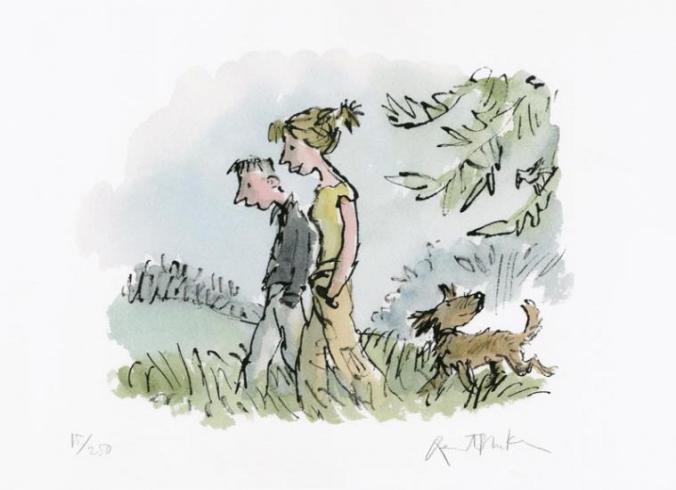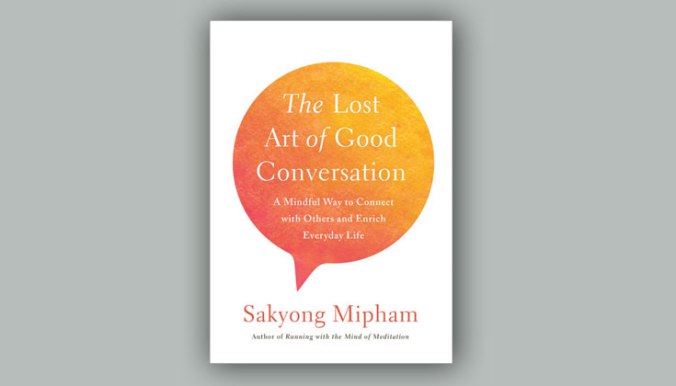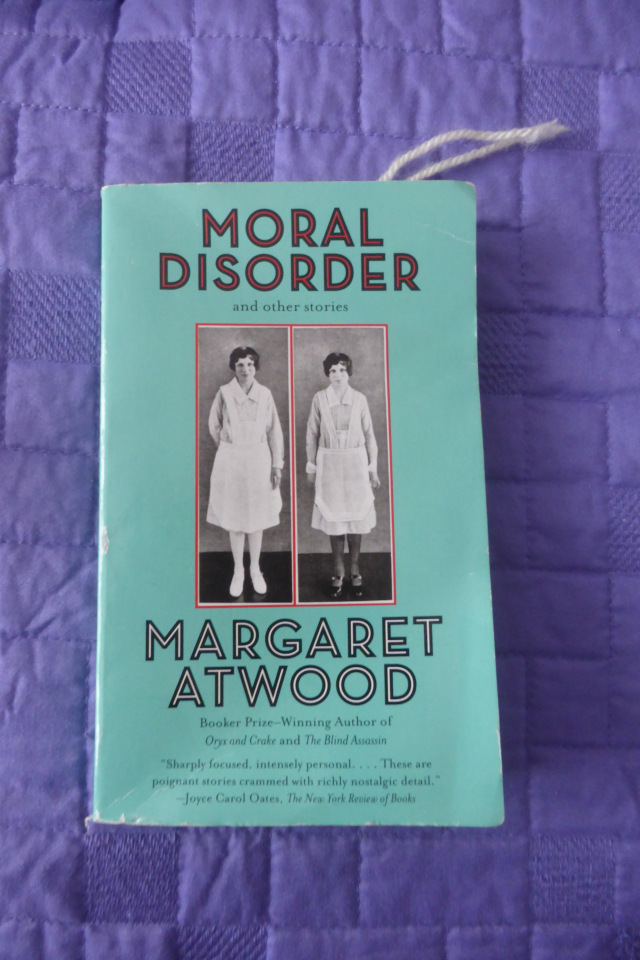
“Beginning a conversation is an act of bravery,” writes Sakyong Mipham in his book The Lost Art of Good Conversation, “When you initiate a conversation, you fearlessly step into the unknown. Will the other person respond to favorably or unfavorably? Will it be a friendly or hostile exchange? There is a feeling of being on the edge. That nanosecond of space and unknowing can be intimidating. It shows your vulnerability. You don’t know what is going to happen. You feel quite exposed. There’s a chance you’ll experience embarrassment. Yet this very feeling is what allows you to connect to the other person.”
As a shy, introvert, I cannot stand small-talk. I’m not good at idle chit-chat. I would much rather have a deep, meaningful conversation with someone than to stand around in shallow, prattle. Social occasions are a nightmare to me. At neighborhood parties, I tend to find myself a corner to watch others and to wait out my time until we can leave and go home. For me to initiate a conversation takes a lot out of me. I feel exhausted after I have been to one of these social gatherings. This is not the case when I have lunch or coffee with a friend and we have real conversation with each other. “Even brief moments of genuine conversation,” Mipham writes, “can uplift our entire life.” I know I feel this way when I have genuinely connected with someone.
In a culture were most communicate through texts, short-hand use of words or emojis, or there is talk radio where the host spews his or her thoughts on politics or the world, or social media where people post comments (often vile, negative ones that they would never say if they were standing in front of that person). Sakyong Mipham says that this negativity in our communication comes “because we take less time to think before we speak, we may project our anger around the globe via media before considering the outcome.” In an age with instant connection, via the internet, people have lost real connection with each other and, in that loss, the ability to have good, meaningful, mindful conversations with each other where we both speak and listen. There is a loss of civility. “The danger,” says Mipham, “is that while we are more connected now to the whole world than we have ever been before. we are less connected to people in our everyday life. We’re having fewer and fewer conversations.” Certainly I have noticed, when my family goes out to eat, that when I look around, we are in the minority of people who are actually talking to each other instead of all of us being on our phones.
What are we losing by not having conversations but are opting out by merely messaging or texting each other? “A conversation is based on physical presence, which is rooted in felling. All of our senses are involved. By talking to someone in person,” Sakyong Mipham writes, “we gain access to specific senses: appreciation, compassion, and love.” When we are having such a conversation, we pick up on more than just the words but the expressions and the feelings of the person we are talking to. It requires our attention. As Simone Weil so aptly understood, “Attention is the rarest and purest forms of generosity.” When we take the time to spend it with someone else, to listen and open and share with them, we become closer and more deeply rooted in each other’s lives.
Social gatherings exhaust me. I feel as if I have been drained and depleted. After I come home, I find myself retreating to be alone to, essentially, replenish myself. When I have had a great conversation with someone, I feel invigorated and challenged and encouraged and connected to that person. We are invested in each other’s lives. These interactions are less stressful to me and less draining, despite the fact that I am more vulnerable and open with this person than I am at a dinner party or social engagement.
Meaningful and mindful conversation brings beauty and a richness to my life. I am present to them and they are present to me. From conversation comes relationship, which is something one cannot get in a meet-and-greet type setting. There is an intimacy to conversation, a sharing of stories and self, of laughter and, sometimes, tears. There is a “connectivity” that is “the heart of all conversations and relationships.” Conversations engage our minds, our hearts, our imaginations, and our emotions.
Good conversation is not asking someone how they are doing just so we can wait for them to finish and we can really get to talking about ourselves and what we are going through. As the essayist William Hazlitt noted, “The art of conversation is the art of hearing as well as of being heard.” How many good conversations can we say we have truly had? In a world where everyone wants to be heard, one of the greatest acts of love we can offer is to be silent and listen. There is never a lack of talkers, but there appears to be a rareness to those who are good listeners. It is something I often struggle with as I listen to someone telling a story and I am thinking, “When will they get to the point?” This is not listening and there need not be a point. Conversation is not about negotiation, or bargaining. Our conversations should be transformational, not merely transactional. It is allowing someone to share and to be heard.
To be mindful in our conversations means to be present. Present to the other person and not distracted but listening carefully to their words, their meanings, and what is underlying what that person is saying. It is to be present in one’s surroundings and not be constantly checking one’s phone or thinking about all of the other things one needs to do that day.
Good conversation is sharing. Of finding the other person worthy enough to listen to them and that they do the same for you. It is being intentional. It is being empathetic and compassionate towards another human being, which we need more of in this world of reaction and frustration and declaration.
Sakyong Mipham writes that good conversation is asking oneself before one speaks a single word: Will I create war or will I create peace?
What are we offering with the very words we are saying?
We must contemplate what we are going to say, why we are going to say it and should we even say it.
Good conversation is a balance of listening and speaking. It is like a great work of music where there are the notes that are being played and then there are the breaths and silences between them. Music is composed of notes and silences just as a great conversation is. It is an interplay and an exchange. Giving of our time and ourselves to listen and share with another person is a precious gift. It is a building of bridges, not walls. A conversation is an act of both “bravery” and “vulnerability.” We move beyond our self and our own self-interests, to the interests and needs of another. It is a place of healing and hope. It is a place of sharing and allowing the other person to be themselves and not pretend or wear a mask. Good conversation is, ultimately, an act of love.
One cannot help but wish more would take the time to cultivate and nourish such conversations in order that we might begin to see the world and ourselves quite differently afterwards.







